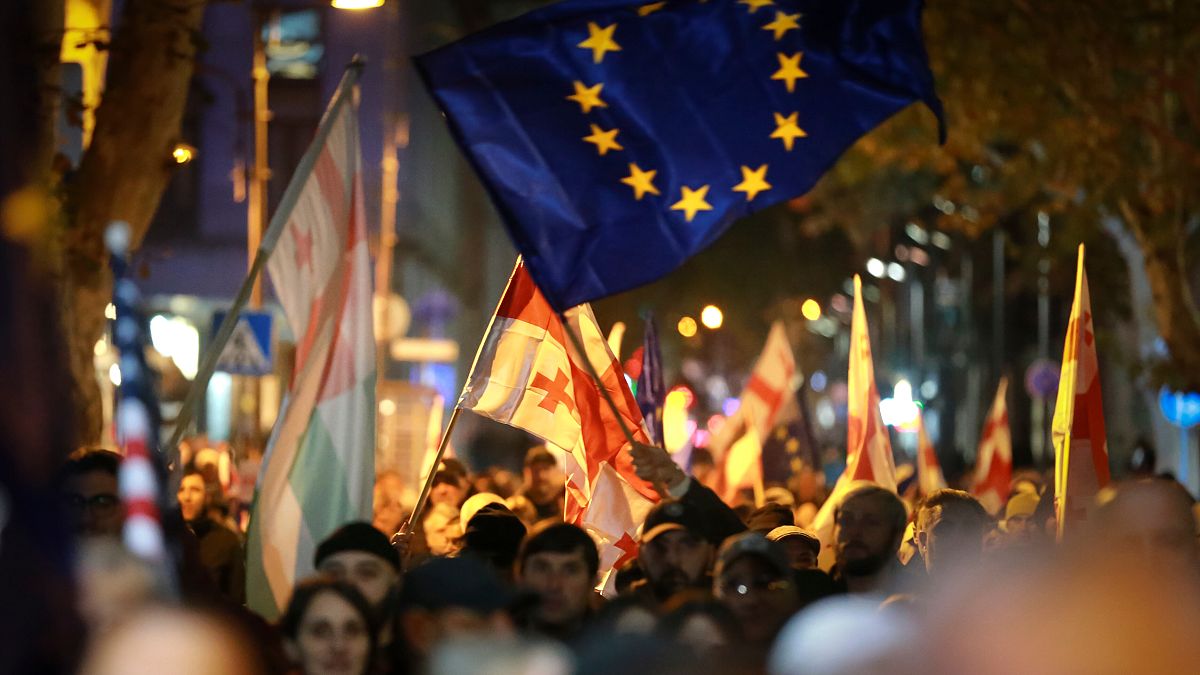Thousands of Georgian opposition supporters continue to rally in Tbilisi, demanding new parliamentary elections under international supervision and an investigation of alleged election fraud. The ruling party, Georgian Dream, was declared the winner of the 26 October election amidst allegations of vote-rigging supported by Russia. Protesters gathered outside the parliament waving Georgian and EU flags, demanding a legitimate election process. Opposition leaders have vowed to boycott parliament sessions and hold regular protests until their demands are met, refusing to recognize an illegitimate parliament.
The Central Election Commission announced that Georgian Dream won approximately 54% of the vote, dismissing claims of fraud made by the opposition. President Salome Zourabichvili, who has rejected the official results, believes that Georgia is being pressured by Moscow against joining the EU. She has called on the US and EU to support the demonstrations. Washington and Brussels have urged for a full investigation into the election, while the Kremlin has denied any interference. Opposition leaders are gathering evidence of violations to push for a new election and have vowed to organize protests not only in Tbilisi but across the country.
Georgian Dream has been in power since 2012 and was established by Bidzina Ivanishvili, a billionaire with ties to Russia. The opposition accuses the ruling party of becoming increasingly authoritarian and aligning with Moscow. Recent laws passed by Georgian Dream have raised concerns over freedom of speech and LGBTQ+ rights, leading to accusations of adopting methods similar to those used by the Kremlin. European election observers reported instances of bribery, double voting, and physical violence during the election, which took place in a divisive atmosphere. The EU indefinitely suspended Georgia’s membership application process after the passage of a Russian-style “foreign influence law” in June.
Tensions are high in Georgia following the election, with many viewing it as a crucial referendum on the country’s EU accession efforts. Citizens are frustrated with the lack of progress towards joining the EU and are hopeful that the ongoing protests will result in fair and free elections. Despite promises to continue pursuing EU accession, Georgian Dream also aims to reset ties with Russia, its former imperial master. A history of conflict between Georgia and Moscow, including a brief war in 2008, has complicated relations between the two countries. Last week, Georgian prosecutors launched an investigation into the alleged vote-rigging, although the opposition has raised concerns about the independence of the investigation due to ties between the Prosecutor’s Office and the ruling party-controlled parliament.
The situation in Georgia remains uncertain as opposition supporters continue to demand new elections and international supervision. European leaders have called for a thorough investigation into the election process, while tensions between Georgia and Russia complicate the country’s path towards EU accession. Protesters in Tbilisi and beyond are determined to hold Georgian Dream accountable for alleged election irregularities and are calling for a fair and transparent election process. The future of Georgia’s democracy hangs in the balance as opposition leaders and supporters work towards their goal of new parliamentary elections under international scrutiny.




































